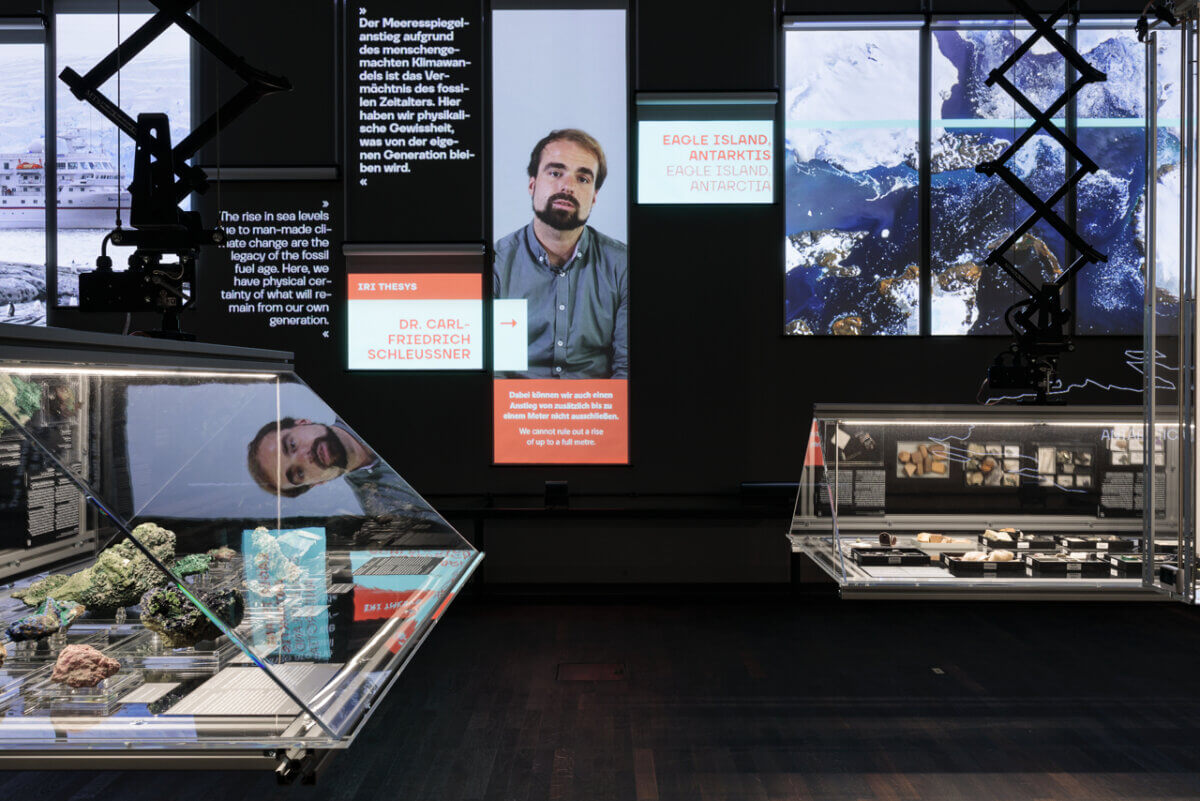Political and Societal Dimensions of Global Problems
SCRIPTS is to play a central role in the exhibition along with IRI THESYS, the Humboldt-Universität’s integrative institute that conducts research into transformations of human-environment systems. “Together,” says Dr Gorch Pieken, head curator of the Humboldt Lab, “they represent the two cultures of science.” The natural science approach of IRI THESys is linked with the social science perspective of SCRIPTS. Answers to global problems such as the climate crisis or the decline of biodiversity can only be found if their political and societal dimensions are taken into account, the curator says. Challenges of this kind, key challenges of the present, are dealt with on a kinetic wall about six metres tall and 25 metres across. It consists of mobile and telescopic blinds onto which videos, images, world maps and data visualisations can be projected.
SCRIPTS is showing video interviews with some of the cluster’s 38 professors in 17 disciplines, says Cordula Hamschmidt, coordinator of its Knowledge Exchange Lab and in charge of external presentation. SCRIPTS is a project of the Freie Universität Berlin in cooperation with the Humboldt-Universität. Other participants are the Berlin Social Science Centre, the Hertie School, the Centre for Eastern European and International Studies, the Deutsches Institut für Wirtschaftsforschung (DIW Berlin), the German Institute of Global and Area Studies and the Leibniz-Zentrum Moderner Orient.
The Promises of Liberal Democracy
SCRIPTS, a relative newcomer among clusters, is presenting in the Humboldt Lab mainly methods and approaches. Its focus is on the liberal script’s promises: freedom, equality, progress, legal certainty, control over nature to establish security – and exploitation of nature to create growth and prosperity. “That is the framework of what we have to say,” Hamschmidt explains.
The liberal model of societal order has repeatedly been subject to changes and has faced a wide range of challenges, such as those of fascism and of real existing socialism. In the exhibition the focus is to be on developments, internal contradictions and external contestations.
“I believe the general message to be that the liberal script is not only more complex but also perhaps more controversial than we might like it to be,” says cluster research scientist Prof. Dr. Schirin Amir-Moazami of the FU’s Institute of Islamic Studies. A cornerstone of SCRIPTS is its strong roots in regional studies. Cooperation between experts on different parts of the world is intended to facilitate global perspectives.
Current debates, such as on how to deal with the corona pandemic, are very Eurocentric, says Professor Börzel. Even within Europe the question of European solidarity is often reduced to economic aid for Italy, France and Spain. Little public attention is paid to the situation in poorer European countries or to the refugees in Greek camps. “And next to nobody mentions the consequences of the pandemic in the southern hemisphere. We are talking very much in circles about ourselves,” says the cluster’s spokesperson. That is why SCRIPTS is trying to do it differently.
In addition to permanent reflection on one’s own regional and historical point of view, taking global interrelationships and power structures into account plays a central role.
